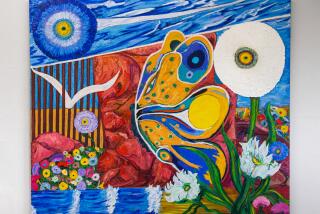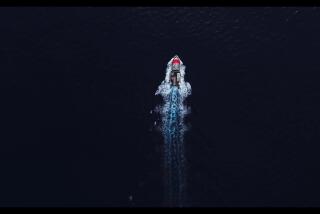To Fly Forever : The Wind Over an Open Cockpit Frees Cliff Robertson From the World’s Cares
- Share via
“Nineteen years ago, just before we mar ried, I told Dina Merrill about my eight children.
But there’s only one, she said, a daughter by a previous marriage. Wrong, I said. Come down to the hangar at Santa Paula Airport and meet the other seven.
I told her that no matter my devotion and commitment to marriage, I would not forsake my airplanes, my children. They were an established part of my life. They were paid for. They had a home. And when I rented them to movies and television shows, they even paid their way.
Dina accepted that and we kept the airplanes.
But I did give up hot-air ballooning.
Now, as then, my collection includes a Spitfire that flew with the Royal Air Force in 1943. I have three British-built Tiger Moths from the ‘30s and another vintage biplane, a French Stampe . My German Me108 from World War II is on loan to the Experimental Aircraft Assn. museum at Oshkosh, Wisc. And there’s the twin-engined Beech Baron that I use for scouting locations, getting from A to B--or from A to Z, if Z doesn’t happen to have commuter air service.
This isn’t materialism. I don’t think of the airplanes as possessions. They are my dear friends. I share their life and they fulfill mine. I treat them as I would a friend: respect them, trust them, never take them for granted.
I had my first airplane ride when I was about 8. It was Christmas Day at Lindbergh Field in San Diego, and Santa Claus had arrived by airplane. They were taking people for rides, and I went up with my cousin and uncle in a Lockheed Orion.
It was all red and owned by the Gilmore Oil Co. I can remember exactly where I was seated. The inside was all leather, even the ceiling. The smell, the noise, the motion. All the hopes. All the wishing. Here was a fantasy consummated by a dream machine, and when I came down to earth, I was still up there.
I became my heroes--Tailspin Tommy of the Big Little Books, Smilin’ Jack of the comics and a guy named Lindbergh.
I used to ride my bicycle from La Jolla into San Diego in the summertime, when I was 14, to work at a little dirt-strip airport called Speer. I was an airport rat--washing airplanes, cleaning engine parts, doing all the dirty work for which I didn’t get paid a nickel--but every third day they’d take me up in a Piper Cub and give me 10 or 15 minutes of instruction for free.
Today, I prefer to fly the old planes, as I love to drive my 1966 Ford Mustang and live in a 1925 house in La Jolla. There’s honesty in the craftsmanship they represent. There’s a greater fidelity to the love affair--something you just can’t seem to find with newer, flashier things.
I also get a deep sense of yesterday from my planes of the ‘30s. They take me back to boyhood--to a more innocent time of life, a period of pure joys. They are the residuals and remembrances of an uncomplicated, easier part of my life.
I once directed a movie called ‘The Pilot.’ I played an airline captain, an alcoholic whose life and marriage were in big trouble but who had two wonderful things in his life to fall back on--flying and his 11-year-old daughter.
I wrote one scene myself. In it, the pilot tells his daughter about Tailspin Tommy and Charles Lindbergh. ‘You know,’ he says, ‘Tailspin Tommy was really Charles Lindbergh. Only Lindbergh made a mistake. He landed in Paris, and that’s when his troubles began. Tommy just kept on flying.’
I relate to that. Whenever I land, the pace has to resume.
It’s quite simple. I resent much of today. The accelerated life style is too complicated. Unbridled building has submerged much of yesterday. With it has gone gentleness, dignity and quality of life.
I thank God I’ve got flying.
As a musician would say, the old biplanes are more legato. They are a pause in a hectic, crazy vortex--a comfortable saddle and my Walden Pond. Up there, the wind over an open cockpit disengages me from the cares that infest the world.
Part of the time, I’m honing skills; but there are moments for hearing the wires, smelling familiar fumes, watching fabric quiver, feeling perfect balance, and then--through that Proustian sense-memory--I go back to a little hangar at Speer Airport where I cleaned engine parts.
You can’t go home again, but you can stand in the doorway for a few minutes.”
More to Read
Sign up for The Wild
We’ll help you find the best places to hike, bike and run, as well as the perfect silent spots for meditation and yoga.
You may occasionally receive promotional content from the Los Angeles Times.






